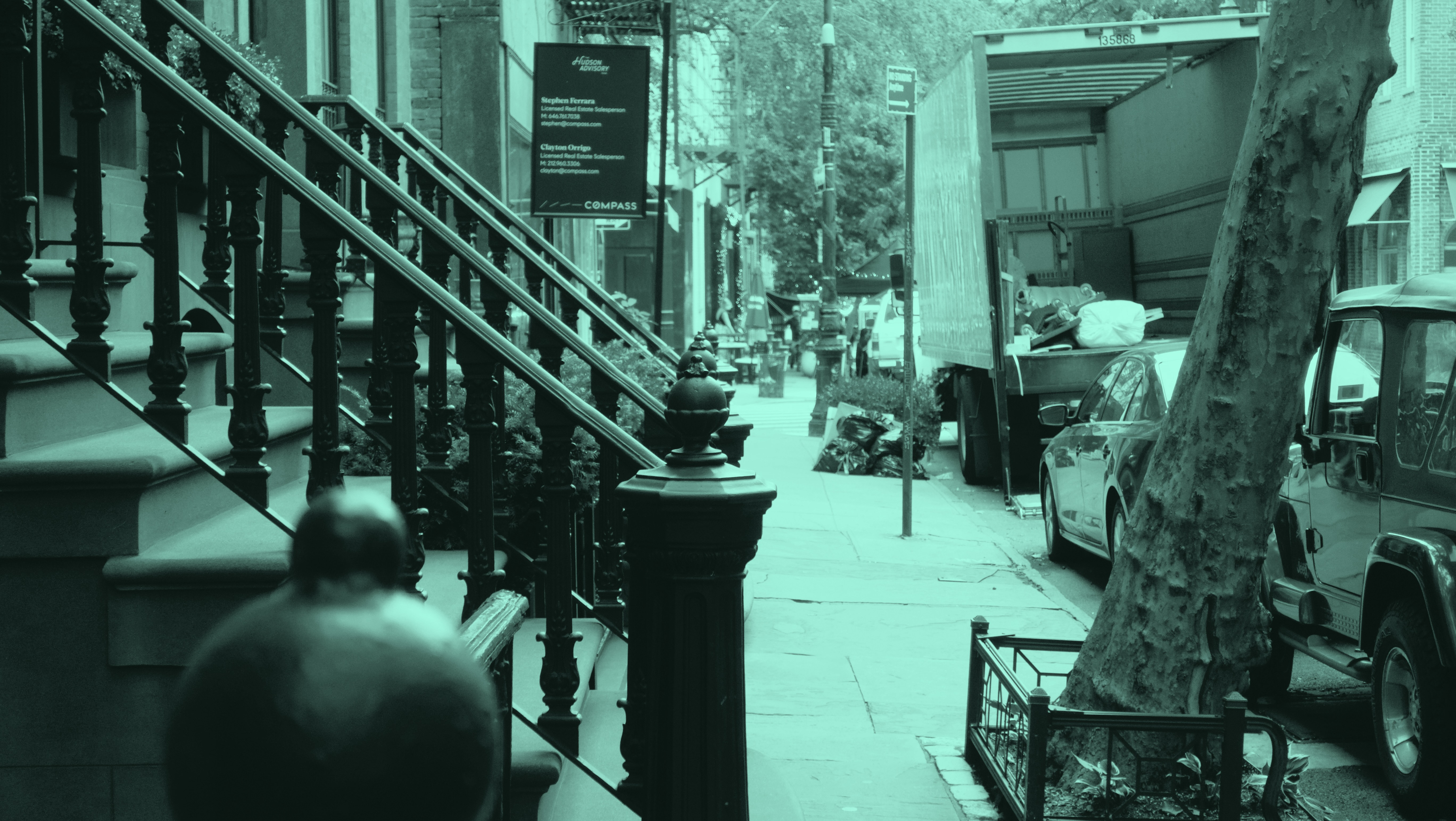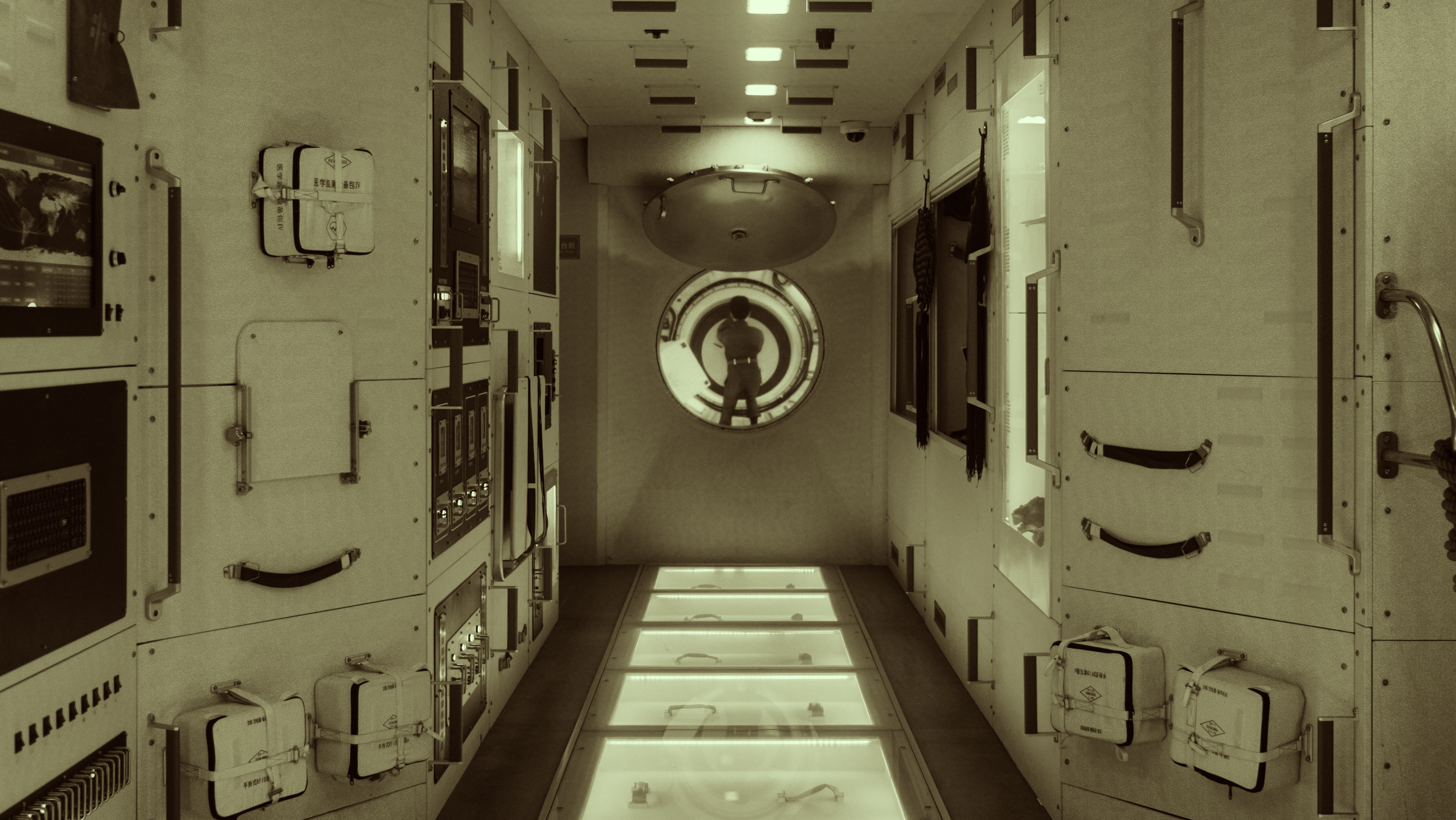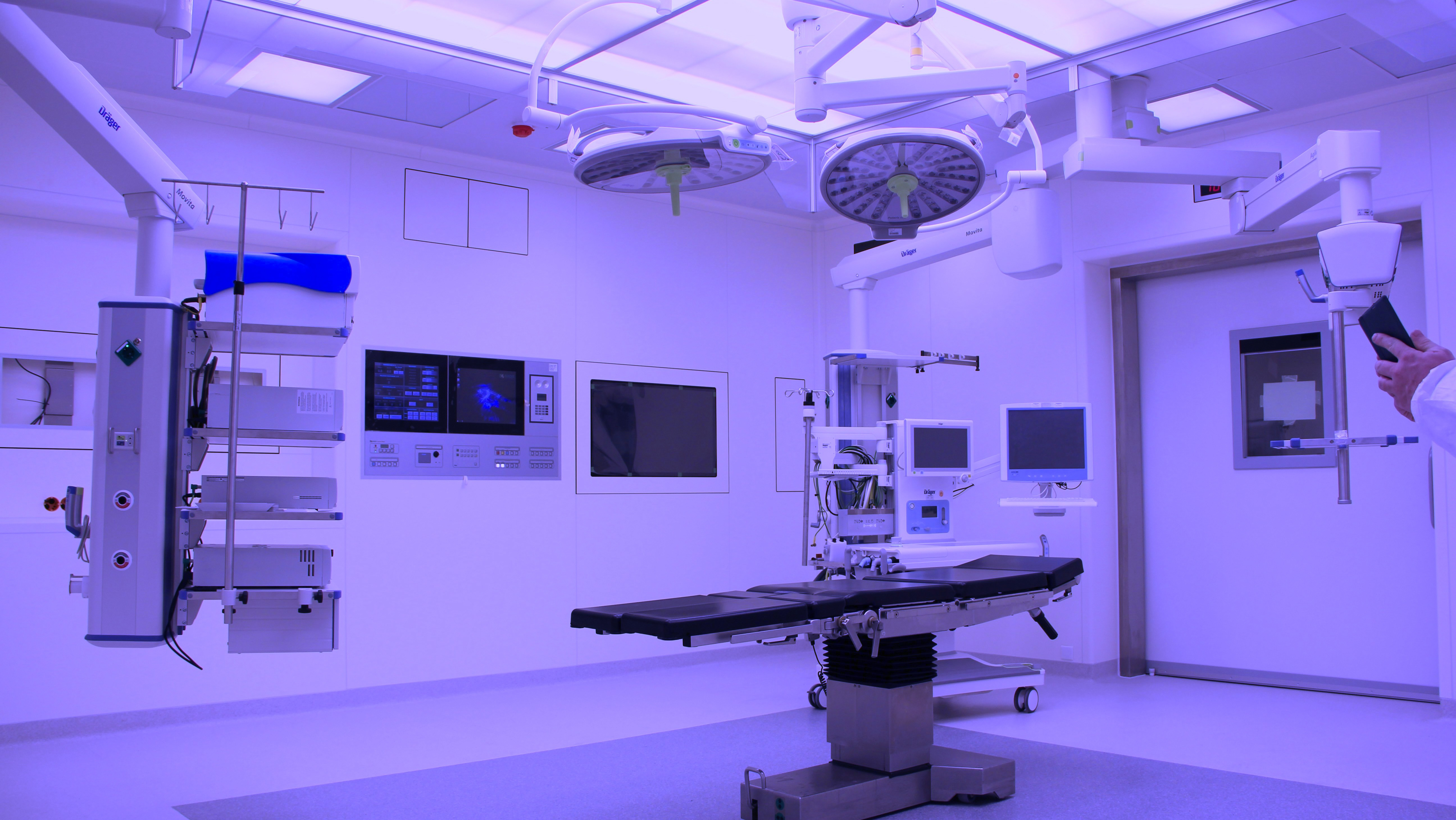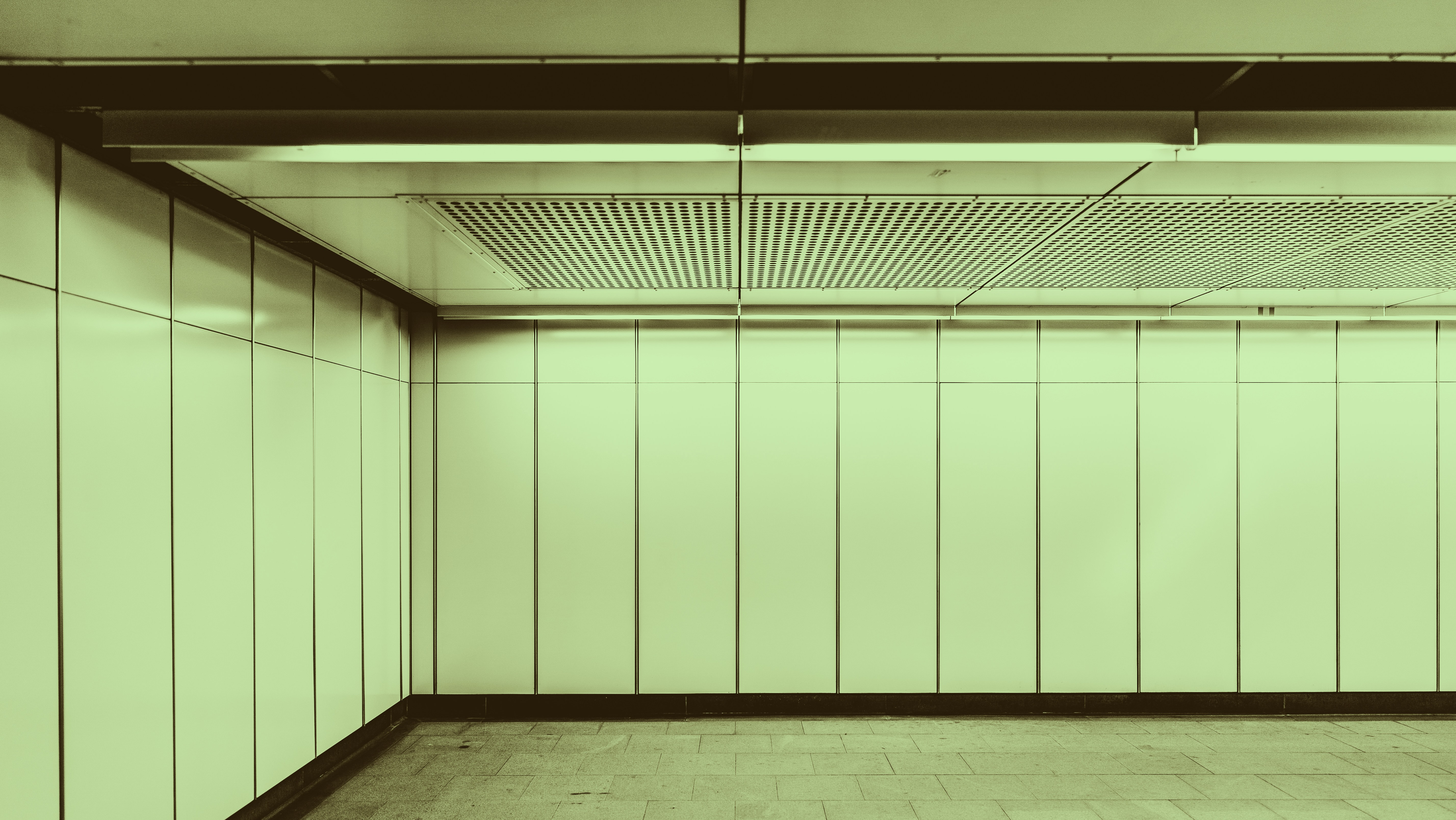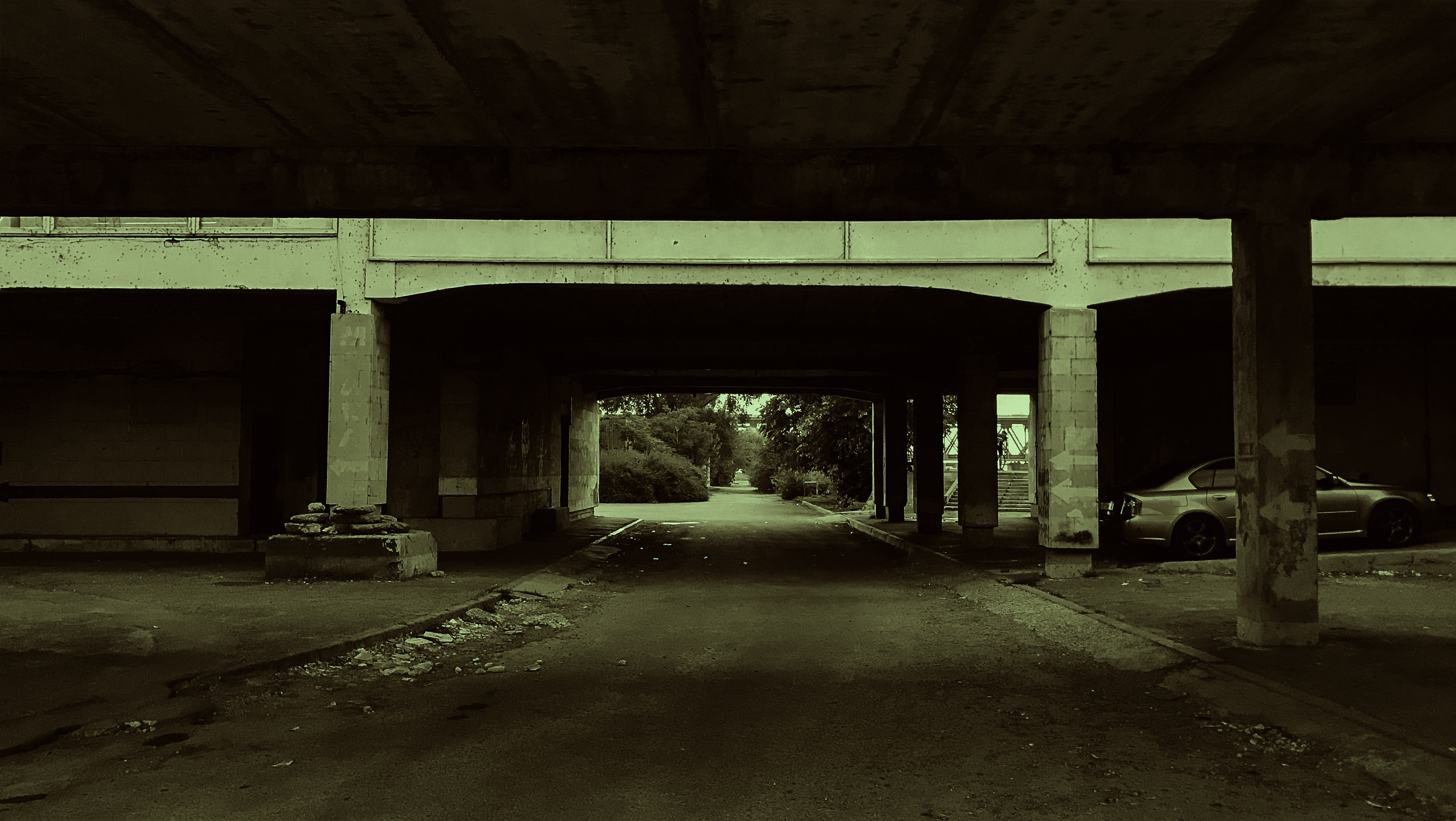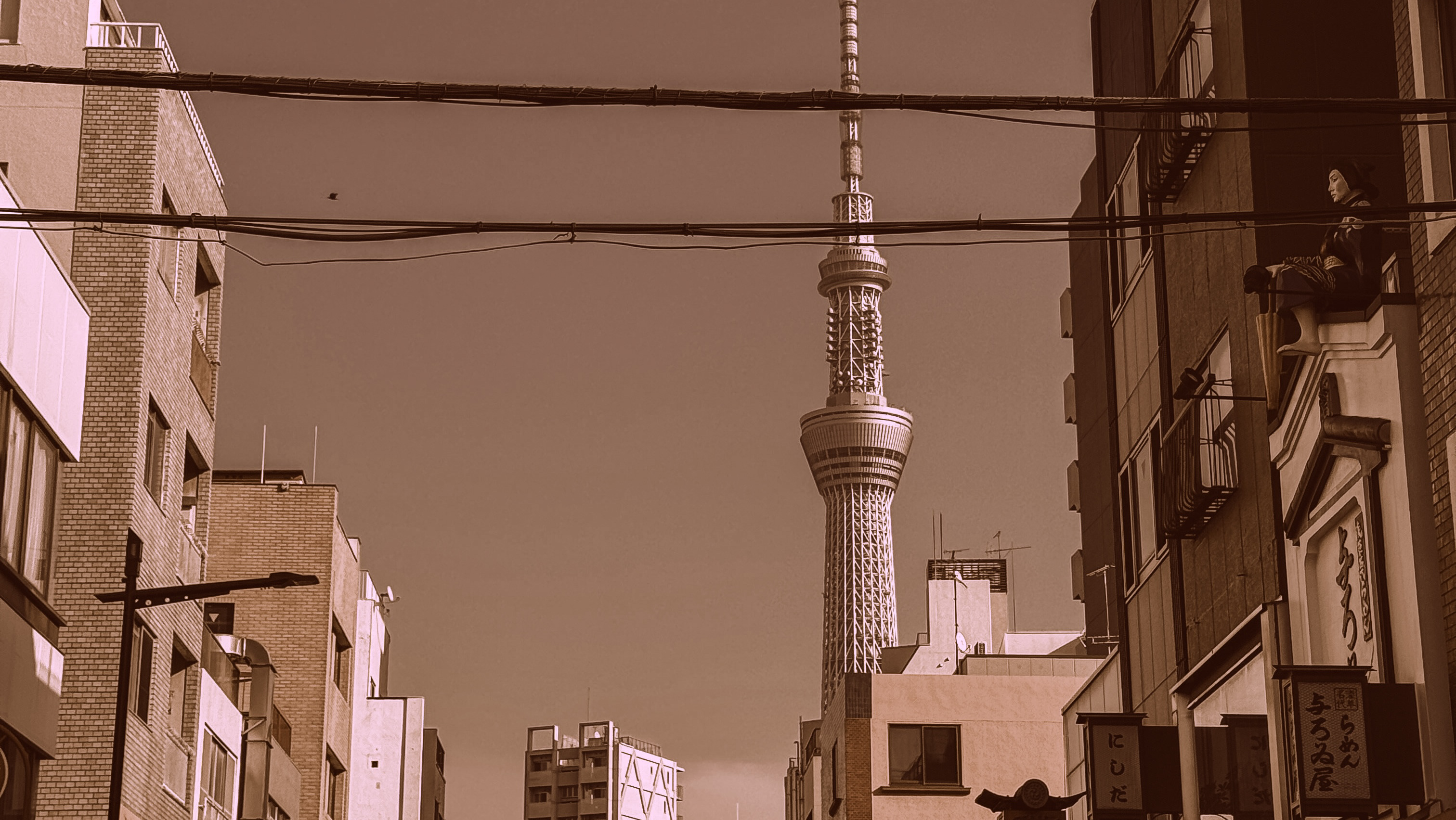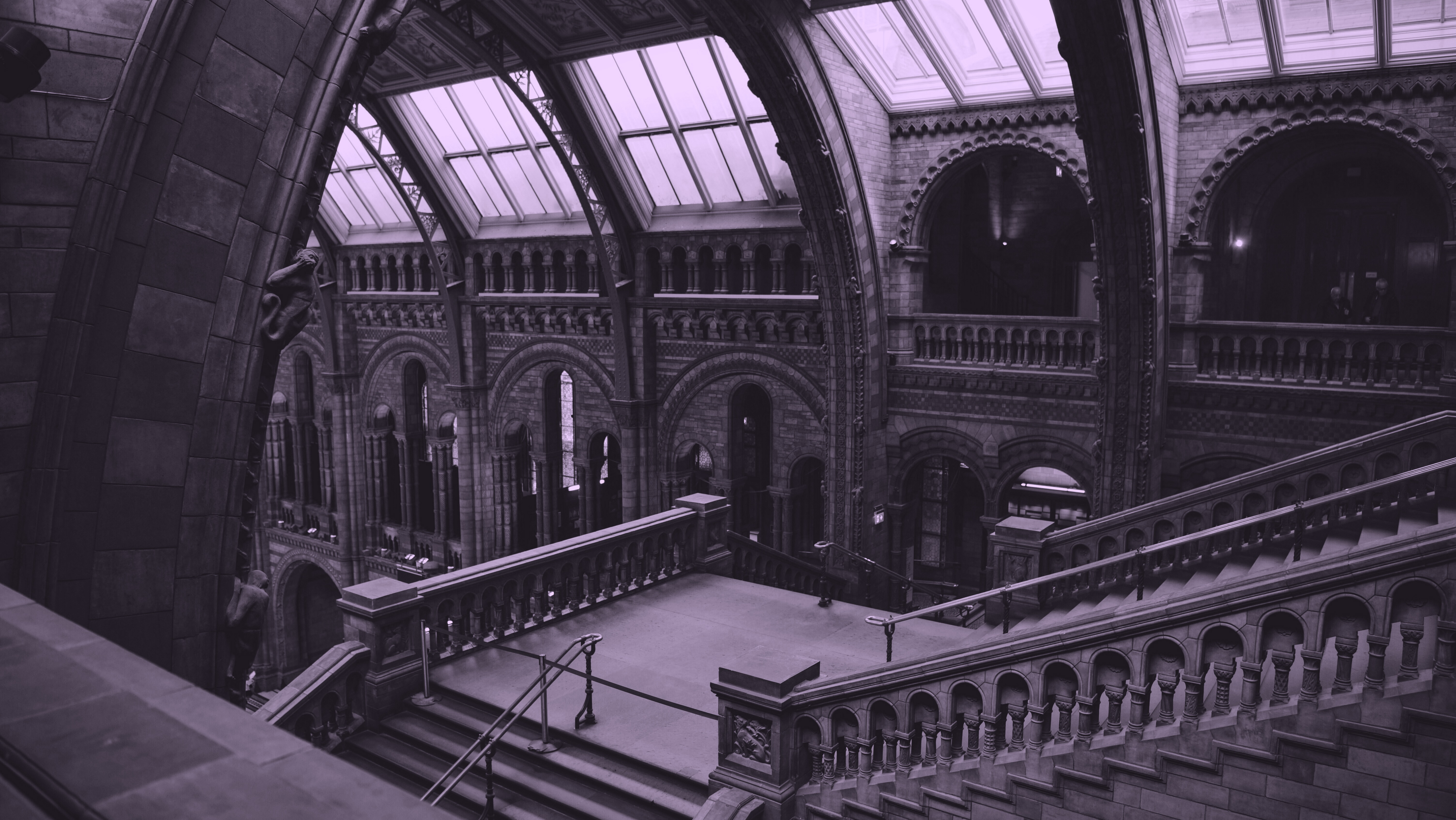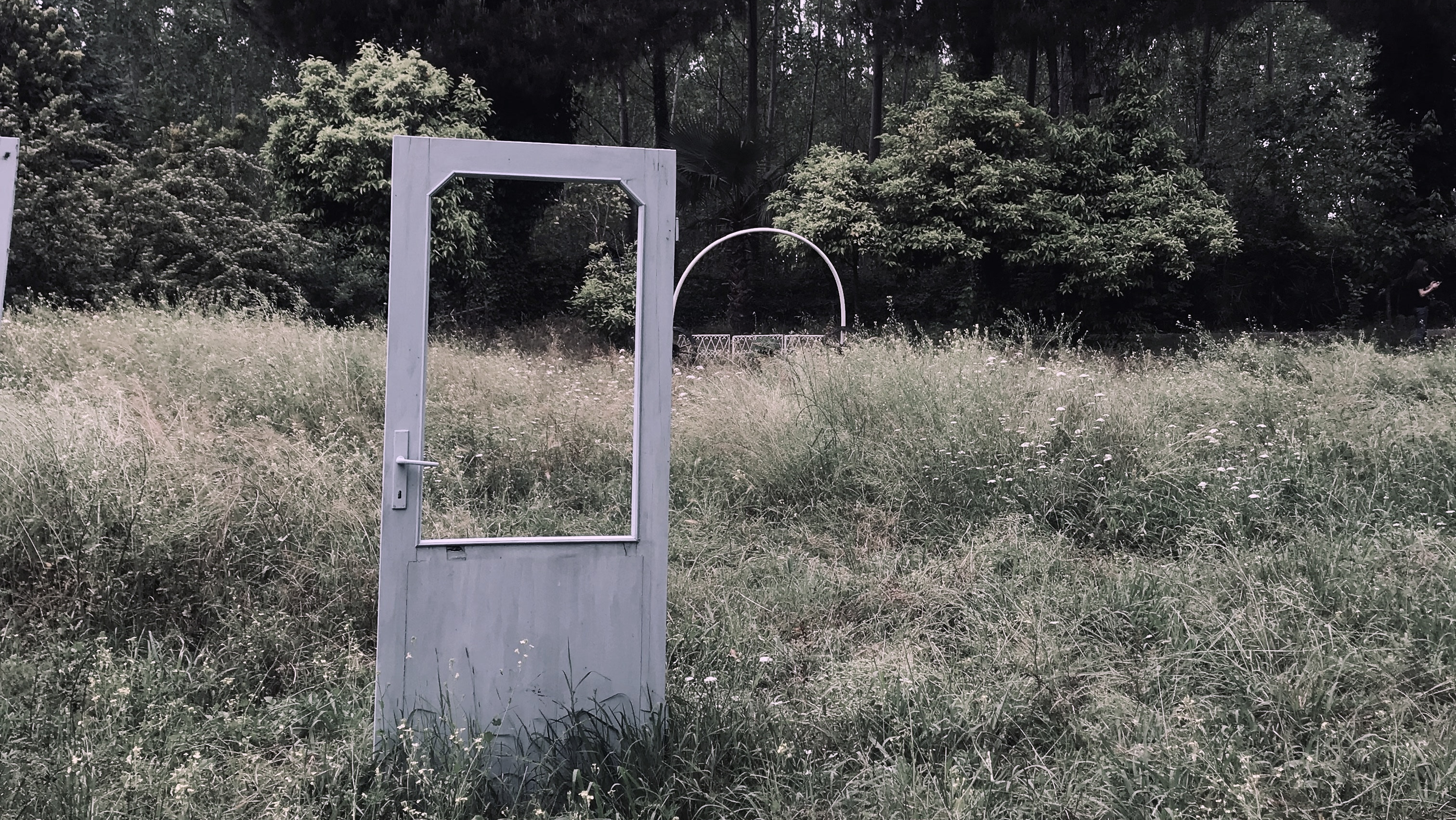Every night was the same. The bedside alarm beeped at 5:45pm and Nelson roused from his sleep, groggy but not refreshed. There were some nightmares that play on repeat in the mind, he decided years ago, hoping you’ll someday pick apart their meaning. But he’d never had the patience or personality of someone who could pull meaning from the obscure. He believed in facts and routine, and in his highly regimented lifestyle, there wasn’t room for anything else.
He switched on the evening news, lowered himself to the floor and performed his pushups and sit-ups, calisthenics he required to navigate the night ahead of him. When he was finished, he stumbled the few feet across the brittle wooden floor to the kitchenette. His muscles groaned with every step, until he arrived at the sink, a mirror frame hung above it void of the glass that once filled it. He kneaded his shoulder with his knuckles and looked down into the stained sink basin. He pulled his toothbrush from its holder and raked it across his teeth, his mind beginning to churn for the day. That engine, firing pistons, creating connections, awakening consciousness from its slumber. He shaved whatever whiskers had grown over the course of his sleep. He splashed cold water over his face three times. And after the third time, he took a deep breath, filling his lungs, holding for five seconds, then releasing. A bracing ritual, before he turned to face the drab efficiency apartment he’d called home for God knows how long.
The room was small, functional. Whatever charm there was, wasn’t Nelson’s doing. The decor had gone unchanged for decades. The only evidence of his inhabitance was an old suitcase in the corner and a photograph pinned to the wall of him embracing a young woman. She with long flowing hair, and he with his sensible buzz cut, standing beside a granite slab with the words Haxon | Lo carved into its face.
Nelson studied the photograph, searching the young woman’s face for clues. For secrets. For any memory that would help him find her. But he’d never had the best of memories, preferring instead to focus on what was right in front of him. So after sufficient time revealed nothing, he sighed, pulled on his tired grey work coveralls, and headed out the door.
Evening traffic churned along the main road as Nelson walked to the bus stop. He stuffed his hands in his pockets to keep warm, inched his shoulders forward and tilted his gait against the cool spring wind. Vermont had been unseasonably warm for decades now and snow was a distant memory, unless you lived higher up in the mountains. But at sea level, right on the outskirts of Alcott County, skyscrapers and mega structures stood in silhouette against the night sky. And as he reached the bus stop, Nelson wondered if those thick monoliths of metal and glass had replaced the mountains this region was once known for.
Nelson eased himself onto the bus stop bench, and glanced over at the older woman in a thin purple track suit sat on the other end. Her fabric swished with every inquisitive movement she made toward him until their eyes finally met and she offered a smile. But it went unanswered. Long ago Nelson's face had soured and frozen into a sort of grimace that warned off polite conversation. He preferred silence. He preferred to live in his thoughts.
“Headed to work?” she asked, not taking his hints. Nelson nodded and crossed his arms. He could feel her eyes scanning his appearance, hunting for information.
“What do you do?” she asked further. Nelson sighed loudly and did his best to conceal the Haxon | Lo employee badge clipped to his front pocket. But he was unsuccessful.
“That company you work for… shameful,” she offered, unprovoked. And she received no response from Nelson, even as he fought the urge to agree with her. Instead, he looked down the road at the welcome sight of a bus approaching, thankful the moment would be over soon.
Through the bus window, he watched the city rise against the setting sun. Lights filled the thousands of windows speckled across endless office buildings and apartment complexes. There was a time in the distant past when these streets were nothing but fields and farmland. When a car would pass by once an hour, and the population was so sparse, residents knew everyone’s name and would wave or exchange gossip for a few minutes before continuing about their day. That was the past, Nelson thought. With a rising population squeezed into tighter and tighter spaces, they grew desperate for that long lost seclusion. But not one person thought to retreat from the connectivity they’d grown attached to. Not one thought to escape to the mountains, where there were no fiberoptic lines. Where there were no cell towers. Where there was only oneself and a natural world that predates our novel advancements. The people of Alcott County retreated to their interior worlds. Their meta-selves. They would rather close their eyes, than find a new perspective in the world laid out in front of them.
Nelson reminisced in that quieter world. He remembered in some vague recollection a camping trip he took with Patricia way out in the White Mountains. The details were hazy but he knew he had spent weeks planning their trip, marking maps for the best routes with the best views. And, of course, a few hours into their adventure, Patricia wandered off trail for a better view and they never found their way back to that highlighted line on Nelson’s meticulously organized itinerary. She had asked over and over again why he was so mad. She couldn’t understand why he couldn’t just get lost and appreciate where the world wanted them to go. But his anger in her casual dismantling of his plans muted him from any constructive conversation. He only shrugged and grunted non-words. Eventually, they found an area to set up camp and she made him a drink and they relaxed into the stillness. It was just them out there. Lost in the wilderness and many miles from home. Pine trees shimmered against the wind. She fell asleep happy in their isolation. But Nelson couldn’t help but sit up half the night, studying his maps, locating where they were and formulating the best route back to the parking lot in the morning.
Despite Patricia’s wanderlust, Nelson was drawn to her. She was his guiding light. Their relationship began as two people lost in long discussions on the discoveries each had made in their doctoral studies. They would discuss the impact technology was having on humanity and what cost connectivity would have on the planet’s future. Nelson believed we were destined to expand whatever future we could dream up. But Patricia was more cautious. She thought it was important to take stock in what we would lose with every step forward. We can’t step backward in time, she would often say, so we have to be surefooted wherever we’re going.
The bus stopped outside of Haxon | Lo Main Facility right beside that granite facade Nelson and Patricia had taken their photo. Cars lined up behind the security gate to scan badges and exit the facility. Nelson watched scientists on their way home, most of them able to successfully partition their work life from their family life. A partition Nelson was never able to master. His mind was always working. Always searching.
The monorail took him from the main gate, past elevator banks 1-107, past the hydroponic farms, past the manufacturing plants, to the janitorial services department in sub-basement 6. He always marveled at the scale of Haxon | Lo Main Facility. How it had grown so quickly. How it had assumed parental guardianship of the world. And how every night at 6:30pm, the majority of its 800,000 employees departed the complex for the night and Nelson was left alone to clean up whatever messes they had made throughout their work day.
Nelson spotted Mr. Melkin behind his desk when he arrived. He had hoped to get in early enough to sneak past him. The young man was early in his career, devoted, and had committed the Haxon | Lo employee manual to memory as far as Nelson imagined. The ding of the punch-in clock pulled his attention to Nelson.
“Ah, employee JS-2119,” he said, offering his youthful smile. “Glad I caught you.”
Nelson raised his chin, grunted, and waited for him to continue.
“There was a complaint from laboratory 1622 last night. Apparently their wastebaskets weren’t taken out. You were responsible for 1622 last night, weren’t you?” he said, checking the schedule on his computer screen.
Nelson shrugged. He had no idea what floors employee JS-2119 cleaned in a given night. All he knew what that he bought the badge off a disgruntled employee for a couple hundred bucks.
“This has happened a few times and I’d hate to be forced to terminate your employment over something so easily remedied.”
“Won’t happen again,” Nelson growled.
“Good… good,” Melkin replied, unsure if his warning had landed. “Upstairs is really pushing to replace the janitorial services department with AI, and I’d hate to give them a reason.”
Nelson nodded, looked over his assignment sheet and found the highest floor number on the paper. Laboratory 1088.
He wheeled his cleaning cart to the service elevators and punched in the number for floor 108. He hated how the elevators caused his ears to pop and brought on a mild case of nausea. But he suffered through it with the cold resolve he’d always worn. Nothing could slow him down.
A few labs on floor 108 were still working when Nelson stepped off the service elevator. He pushed the cleaning cart to the first laboratory on the right, 1081, and tapped the wheel brake with his foot. He backed away from the cart, glanced up at the security camera blinking in the corner, and then turned and headed for the stairwell.
Nelson climbed six flights before he found an empty floor on 114. He was winded and sweat-drenched by the time he reached the door, wiping his focused brow with his sleeve. He grabbed the handle, holding it for a moment until he caught his breath.
The floor was dark as Nelson made his way past the first few laboratories to number 1148 at the end of the hall. There was nobody inside. Just the bold glow of computer monitors and a strange humanoid AI mounted on the wall. He entered quietly, avoiding the security cameras, and approached a terminal. He typed in a passcode, one he had committed to memory, and the computer came to life. Onscreen a search box waited for his inquiry. Nelson typed the two words that had haunted him for months. Patricia West.
A list of internal documents and articles populated the screen, each one featuring the name Patricia West. Nelson scrolled down the list, a wealth of information. He opened a lab report and began to read. The report displayed results from a study involving an invention called suplink and suggested it was nearing human trials but that there were several errors to work out before such trials could commence. Nelson wrote the word down on a scrap of paper, his curiosity pushing him to read on.
Until the whir of mechanical articulation drew Nelson’s attention to the AI mounted on the wall. A half-completed skeleton with wiring running into it, strapped to some cage-like structure. It was the most artistic expression of a scientific experiment Nelson had ever seen. The head slowly raised and opened its eyes, narrowing its gaze on Nelson bathed in the glow of the computer monitor.
“Good evening, Nelson,” the AI said in the voice of a specific man in his early sixties. A voice Nelson recognized and made him cringe. “Sneaking in as a trash man, are we?”
“Just tell me where she is, Haxon,” he seethed.
“I don’t know where she is,” the AI said before settling into a confident smile.
“Bullshit. You can see the whole world from that bunker of yours on the 200th floor. You’re hiding something.”
“We’re all hiding something, Nelson.”
“Tell me where she is or call security. I don’t care. I’ll just keep coming back.”
“Oh, I have no doubt you will…”
Nelson went back to his search, doing his best to block out the whirring sound of the AI watching him from its mount. But he struggled to focus as rage filled him with every gyration the AI made, challenging his patience. His mind imagining the smug look of Haxon up there in his penthouse watching him struggle.
“Stay calm, Nelson,” the AI said coolly. “Take deep breaths."
But Nelson’s body tingled as if a violent surge radiated through his veins. Keep your fucking advice to yourself, he thought. And his breathing quickened. He stumbled back from the monitor, gripping his arm. The pain pulsed at an ever-increasing frequency. It felt like a heart attack. Nelson glared at the AI shaking its head from the wall in its pitying way.
“You should really leave the trash in the can,” it said, before everything went black.
Every night was the same. The bedside alarm beeped at 5:45pm and Nelson roused from his sleep, groggy but not refreshed. There were some nightmares that play on repeat in the mind, he decided years ago, hoping you’ll someday pick apart their meaning.
Nelson switched on the evening news and lowered to the floor for his calisthenics. When he was finished, he went to the sink and brushed his teeth and shaved whatever whiskers grew in over the course of his sleep. He splashed water over his face three times, then took a deep breath, holding it for five seconds, before exhaling. His bracing ritual. He turned around and took in his existence, his prefab efficiency. He wandered over to the photograph on the wall of him and Patricia, studying the image for several minutes, searching each area in detail, begging it to reveal something. And when he finally accepted that his memory had betrayed him again, he pulled on his work overalls and left.
He arrived at the empty bus stop and waited in the silence he found comforting. When he was alone, when it was quiet, he could channel his thoughts more clearly. Disparate memories floated freely in his mind without order, but when he was isolated, he could begin to make sense of them. He reached in his pocket and found a scrap of paper. But it was blank. He swore there was something he had written on it, but it alluded him. Just as Patricia had, he thought.
She left for the office on February 3rd. That was nearly three months ago, he thought. She and Nelson had gotten into an argument early that morning. It wasn’t anything new. They fought often. He saw it as a healthy discourse between them. Their love language. But around that time, he remembered how she seemed to be pulling away more. Spending late nights at the lab with a project she was determined to get right. Something she refused to discuss with Nelson, and it made him mad every time silence found its way into that topic. He saw it as a dig against his intellect, as if she didn’t think he was smart enough to handle what she was working on. As if she was exerting her authority as a founder of the company that employed him. And he’d remind her that he held doctorates and fellowships from universities and institutes just as prestigious as she, and that he felt no need to hide his own work from her. But Patricia would always end the argument with apologies and in her low, soothing voice, tell him that her work really wasn’t interesting enough to discuss. And she’d leave it at that.
That morning, the morning of the fight they’d had so many mornings before, was the last time Nelson saw his wife. It was routine for her to be out of contact for a day, but by the following afternoon when he marched up to her lab looking for her, it was empty. He called Haxon but he denied knowing where she was. Nelson thought he was lying at first, that there was something secret going on between them, until the police arrived to question everyone in the building at Haxon's request. They were both bereft for different reasons. They had both lost a partner that day.
The ding of the punch-in clock drew Melkin’s attention. Nelson glanced up at his young supervisor carefully removing his eyeglasses and focusing his gaze on him, sighing in a performative way to show that something heavy was weighing on him.
“Good evening, employee JS-2119,” he said.
Nelson nodded.
“We had an issue with 1088 last night. Complaints about trash not being collected…again.” He waited for Nelson to reply, but he only stared, waiting for the moment to be over. “I’ve scheduled a performance review for the end of the week. I think we need to discuss your future here at Haxon.”
Nelson grunted. He didn’t care. He’d be gone by morning with what he’d come for. He took his assignment sheet, and headed to claim his cleaning cart.
There were a few night owls in the labs on the 166th floor when Nelson pushed his cart off the service elevator. He wheeled to the bathroom and set the brake, then headed to the stairwell and up two flights to 168, where the floor was abandoned for the night. Floors that were empty were less likely to be monitored by security, he remembered from his time in the labs. But just to be safe he scanned for cameras before sneaking down the hallway into laboratory 1681.
The lab was small. A single computer on an upright stand hovered over a stainless steel table filled with robotic facial pieces. Eyeballs, mouths, cheekbones, noses. Each wired to an amber-glowing sphere running its own series of wires into the computer terminal. It looked like an exploded head, Nelson thought before logging in and beginning his search. He scrolled down the list of documents until he found a familiar word that had eluded him — suplink. The word felt familiar, like it had been buried in his unconscious mind until that moment. He clicked on the lab report and the information came flooding back to him. It was all familiar, like he’d read it a thousand times in a dream. It was a brief for a preliminary study of a suppression implant. He poured over every word on every page, searching for clues. Suppression of what?, he thought.
“Good evening, Nelson,” a voice offered from the stainless steel table beneath him. He looked down at a set of lips speaking, eyeballs blinking. A deconstructed face moving as it would if it were whole. “Don’t you get tired?” it asked.
“Tell me where she is,” Nelson replied. His heart beat faster. His face went clammy. His anger roared at the sound of Haxon’s voice.
“I don’t know where she is.”
“What is suplink?” Nelson demanded.
“It was a neural pathway restrictor that Patricia was working on. A sort of therapy. She never got it to work,” the face said from the tabletop. “Nelson, I don’t think she wants to be found.”
“She wouldn’t leave without saying so. You’re hiding something. You know where she is.”
“I don’t,” the face replied.
“We have kids, Haxon. They’re worried sick.” Nelson felt his body temperature spiking without relief. A static tingling prickled all over him. And then again, that radiating pain through his veins. He grabbed his arm and winced at the face spread out on the table before him, desperate to conceal his pain.
Every night was the same. The bedside alarm beeped at 5:45pm and Nelson roused from his sleep, groggy but not refreshed. There were some nightmares that play on repeat in the mind, he decided years ago, hoping you’ll someday pick apart their meaning.
Nelson switched on the news, performed his exercises, then brushed his teeth and shaved. He splashed water on his face three times, then drew a deep breath, holding it for five seconds. A bracing ritual he’d learned from his father when he was young and wanted to punch things. He was told it would recenter him, but he’d always had trouble with the science behind it.
Nelson looked over the efficiency apartment with no feelings whatsoever. The photo of him and Patricia on the wall drew him in, locking him to his purpose. There was nothing new in the photo, just his stoic expression and Patricia’s half-smile, standing in front of the granite Haxon | Lo sign. For some reason, the image sent him back to a memory of their honeymoon, years ago. Before she signed her life away to Haxon.
The short drive up the coast was about all either of them cared to spare for such an antiquated right of passage. They joked in the car that this was the most normal thing they’d done together and it felt otherworldly to them. Nelson tried to change the topic back to something they both cared about, work, but Patricia said she wanted to spend the whole long weekend talking about normal things that normal people talked about. Who knows, we might like a normal conversation, she said with a hopeful smile. But their attempts at it were filled with extended silence, which didn’t bother Nelson, but he could tell it bothered her. She flipped on the radio, commented on a few songs. But his conversation always drifted back to work, so much so that their experiment at normalcy ended before they reached their bed and breakfast in Camden. They spent the weekend discussing their futures. Patricia shared how she had been approached by J.L. Haxon just before graduating from her doctoral program. The young prodigy wanted to start a company with her. Nelson offered his congratulations, which were genuine, but he was always nervous that his own frustrations would present themselves in the same moment. And Patricia would see a form of jealousy he worked very hard to hide from her. He told her he wanted kids. Two of them. It just sort of came out. And they both realized they’d never actually had that conversation before that first lobster dinner in Camden. She was silent for a while, picking at her food, then she told him that it would be difficult in the near future to juggle work and a home life. That they might need to wait a while, until her company was up and running. Nelson followed with his own silence, and then told her that waiting too long put her and their future children at risk of serious medical issues. It was safer to have children sooner than later.
The following day at the beach was far from relaxing. Swarms of parents struggled to corral their kids along the shore. Arguments and tantrums filled the air in some off-pitch suburban chorus, and Patricia looked at Nelson with a sort of I-told-you-so glance that he was not comforted by. He had always been a stubborn man, bending logic to suit his arguments for why his way was the only way, whittling away at anyone foolish enough to debate him. And it worked. Again. By the end of their weekend, Patricia had agreed to divide her time between the family he wanted and the career she wanted.
Nelson sighed and pulled on his work coveralls and headed out the door.
The purple track suit woman was at the bus stop when Nelson arrived. She sat in the center of the bench, so he stood, leaned against the shelter wall. Her clothing swished against the evening wind, and she looked up at him with the accumulated judgment of several run-ins.
“You should be ashamed of yourself, you know that?” she said. Nelson stewed over why this busybody was angling herself in his business. He could feel his blood boiling, and he started to sweat, as he locked eyes on her meddlesome face. His breathing shallowed as he found his voice and fired back, “And you should mind your own fucking busin-”
Every night was the same. The bedside alarm beeped at 5:45pm and Nelson roused from his sleep, groggy but not refreshed. There were some nightmares that play on repeat in the mind, he decided years ago, hoping you’ll someday pick apart their meaning.
He switched on the news, exercised, brushed his teeth, shaved, performed his bracing ritual, looked over his apartment, studied his photograph, walked to the bus stop, took the monorail to the office, and punched in for the day.
Melkin was waiting for him when he arrived, but there was no longer a smile on his face. He was serious, as if he was riding the high of advice given to him by a superior.
“Employee JS-2119, we need to talk,” he said firmly.
Nelson leaned against the office door and waited for Melkin to talk.
“It has become clear to me that my constructive feedback isn’t getting through to you,” he said with a tinge of timidness poking through, “I want to know what I can do to help you succeed.”
Nelson thought about his response, but he was distracted by Melkin’s face. His eyes. The contours of his jawline. Under those harsh fluorescent lights, Nelson could see similarities to his own son Chris. He hadn’t thought about Chris in months. Not since he sent a birthday card. The annual peace treaty proposition that inevitably went unanswered. The two boys were close with each other but never with him. Once upon a time, he was their ride to baseball practice and school dances. But when their friends got licenses, they leaned on them instead. They said Nelson wasn’t reliable. That he was always preoccupied.
“Employee JS-2119? Are you listening to me?”
“Yessir, I am. I’ve been distracted lately. I’ll pay more attention. I promise,” he offered in his apologetic voice, hoping that would be enough. He watched Melkin’s stern face soften as he digested Nelson’s words.
“You’ll do your job? You’ll take out the trash?”
“Yessir.”
“Every night?”
“Of course,” Nelson said.
“Okay, good. I’m glad we could sort that out,” he said, looking back at his computer screen. “And, if you need a sick day, just call in and let us know next time."
Nelson grunted and grabbed his assignment sheet for the night, commandeered his cleaning cart, and headed for the service elevator.
He scanned his badge and pressed 117. The elevator jolted and began moving up, faster and faster. Nelson watched the floor numbers rise as his ears popped and his nausea returned. He felt his stomach churning as the numbers rose past 117, and past 150, and past 190. Until it stopped, unprompted, on the 200th floor. The doors swung open onto a large open laboratory floor. Glass walls adorned with priceless paintings. Antique and modern furniture overflowed with discarded reports and documents. It was a mess, but there was genius to it, he thought.
Nelson crept cautiously along the carpet to the edge of the first laboratory bay and peaked inside. His body tensed as he recognized the man standing at the computer terminal. He’d recognize Haxon’s narrow spectacles anywhere. His tall, thin stature. His calm and purposeful gestures. As if he moved with the foresight of knowing exactly where his technology was leading humanity. Nelson could feel an anger rising within him. He took a deep breath, held it for five seconds, then exhaled. An emergency bracing ritual.
He entered the lab and stood at the opposite side of the room from Haxon.
“How’d you know I’d be here?” he asked.
“You follow a pattern, Nelson,” he said with the confidence of a nurturing parent.
“Pattern? What the hell are you talking about?”
Haxon closed the gap between them, studying Nelson’s face as he whispered, ‘fascinating.”
“Get the fuck away from me. Where’s Patricia? She’s missing. Her family needs her.”
“Nelson, I’d like for you to answer some questions for me.”
“What? Where is my wife?”
Haxon crossed his arms and waited with the patience of a God until Nelson agreed.
“How are you feeling?”
“How am I feeling? Annoyed. Angry. Violent.”
“No…I understand that, and do please try to remain calm. I mean how do you feel physically?”
“What? I’m fine.”
“Your memory, though?”
“My memory’s fine What are you talking about? Where’s Patricia?”
Haxon picked up a file folder from his workstation and pulled an MRI image from it. He held it up to the light, and Nelson could see the dark spots on the brain.
“What is that?”
“This is your brain, Nelson. You’re beginning to show signs of advanced dementia.”
“That’s impossible.”
Haxon handed the MRI to Nelson for review.
“Nelson, when did Patricia go missing?”
“February 3rd. You know that,” Nelson said, as his body warmed.
“Try to remain calm. What year?” Haxon asked.
“What year? What the… this year. Three months ago.”
“…Fascinating.”
Haxon backed away and paced the length of the lab, considering his next words carefully, as Nelson watched him through a bloodied mix of confusion and anger.
“Patricia went missing on February 3rd, 2028, Nelson. Forty years ago.”
Nelson recoiled, “No.” He rubbed his head, “It was three months ago. I know it was.”
“Stay calm, or we’ll have to do this all over again tomorrow night.”
Nelson took five deep breaths, then repeated. “Don’t you think I would’ve noticed getting older?”
“The mind does strange things to protect itself. You and I have been having this conversation for forty years now, Nelson. And every time you’re fired, you sneak back in here under some ridiculous false identity that I’ve provided you with, and you continue with your search. It’s remarkable really, if not tragic.”
“That’s impossible.”
“I thought it would be, too. I thought you’d forget about Patricia eventually, or at the very least realize what was so painfully obvious… that she had gone to great lengths to ensure you never found her.”
“And what about you? You just gave up looking for her? What kind of partner does that?”
Haxon sighed deeply, for both of their sake. “Did Patricia ever mention something called suplink to you?”
Nelson felt his temper rising. His heart beat faster. “No.”
Haxon processed his response. It reminded Nelson of their first encounter years ago, when the young prodigy insisted on meeting him before he was hired, a request Patricia fought against but ultimately failed to overturn. Nelson showed up for their meeting early and waited in the parking lot. Back when there was only a small parking lot out front and no security gate. He paced back and forth, trying to soothe his anger at having to jump through hoops. He had argued with Patricia for days about it, and each round she tried to convince him that they weren’t hoops he was jumping through, but safeguards. And that it was just as important for Nelson to feel like he fit in with the Haxon | Lo culture as it did the other way around. But Nelson always came back to how Patricia, in her subtle unspoken way, reminded him that she was better than him. A claim she always denied.
Nelson had entered Haxon’s office to discover Patricia was nowhere to be found. She had left him to this wolf, he recalled. Haxon offered him a seat and their conversation leapt directly into work, a direction Nelson appreciated. They discussed Nelson’s doctoral projects and where he saw his work going, and then Haxon went into his goals for the company. He saw himself as a shaper of humanity. A figure who would push the world in the direction we naturally needed to go to survive and thrive in an ever-changing environment. Nelson was surprised to find himself so aligned with Haxon’s positions. He left that meeting hopeful for a future within the company.
Haxon turned to Nelson, both older and wiser now. “For a man who had such promise here, you are completely oblivious to the facts staring you right in the face,” Haxon said with a disappointment he couldn’t mask. “Just fascinating.”
“What is suplink? Did you steal it from Patricia?” Nelson asked.
Haxon looked at him with pity in his eyes, “You know how she described you right before I met you in my office for the first time. She said ‘Nelson doesn’t know how to quit.’ She said it like it was an asset, but I was honestly weary of that characteristic. Don’t get me wrong, I like the focused pursuit of a goal. I do. But that wasn’t how she meant it. That’s not how I took it anyway. So I suggested she test her suppression therapy — her suplink — on you. She laughed it off. For years she laughed it off. But then, one day, maybe ten years later, something changed in her. She came into the office a different person. She told me she implanted you with the suplink while you were sleeping.”
Nelson felt his hands running over his body, searching for the implant. “What?” Nelson said.
“I asked her why she did it,” Haxon continued, “and she told me she couldn’t deal with your anger issues any longer.”
“My what? I don’t have…” but he stopped himself, replaying those moments in his mind.
“Every time you start to get angry, Nelson, you reset,” Haxon offered.
“Reset?”
“Nelson, you know this. You must’ve figured this out. Forty years, that thing has been implanted in you. Every time you get angry, you wake up in your bed again.”
“But how do I…”
“I have staff that brings you home. We’ve been monitoring your vitals, continuing the work Patricia abandoned. And we’re able to keep an eye on you, in case she resurfaced.”
“So, why are you telling me this now?” Nelson said, feeling his body warm with anger.
Haxon picked up the MRI image again and held it out to him. “Nelson, you’re dying. I’ve been telling you this for months. But your mind just finds a way to block the information. It’s truly… fascinating.”
“So I’m your science experiment?”
“You were Patricia’s experiment, Nelson. But it needs to end now.”
Sweat beaded on Nelson’s brow. He gritted his teeth, clenched his fists.
“Please stay calm, Nelson.”
But his body shuddered uncontrollably. He charged straight at Haxon, a blind vengeance filling him. “Where is my wife, you sonofabitch?” he shouted, just before it all went black.
Every night was the same. The bedside alarm beeped at 5:45pm and Nelson roused from his sleep, groggy but not refreshed. There were some nightmares that play on repeat in the mind, he decided years ago, hoping you’ll someday pick apart their meaning.
Nelson stared at the photograph of him and Patricia. There was something hidden within the photograph. Something the picture wanted to say to him, but he couldn’t access the memory. A fire bellowed deep within his eyes. His purpose slowly coming into focus again. He pulled on his work coveralls and headed out the door.
The old woman in the purple track suit sat with her arms crossed as Nelson approached, bracing for an argument. But he breathed deeply, holding tight to his calm. Holding his solitude.
Nelson stepped off the bus and looked up at Haxon | Lo Main Facility, nothing about it familiar from the first time he laid eyes on it except for the Haxon | Lo logo carved into a piece of granite from the old building stationed outside the security gates. A memorial of what once was, he thought. He walked up to it and ran his fingers over his surname — West. It was the name he was born with but it wasn’t him in those letters. And the realization of that awakened the jealousy within him. He breathed deeply again, closed his eyes and held his breath for five seconds, then exhaled.
Nelson walked over to the front security gate and swiped his employee ID card. But the machine didn’t beep to welcome him through. He tried again and found the same result. A security guard poked her head out of the entry shack.
“There a problem here?” she asked.
Nelson held up his employee ID, annoyed, “My card isn’t working.”
The security guard took the ID from him and brought it into the shack. Nelson looked up at the facility against the fading light and suddenly he felt like he was at the base of Mount Everest. And before him laid a summit he would never reach.
“You don’t work here, sir,” the security guard said from the entry shack doorway.
“What? No, that’s not possible,” Nelson responded. He felt a warmth coming over him. That tingling anger filled his veins. “That’s not possible,” he screamed.
Every night was the same. The bedside alarm beeped at 5:45pm and Nelson roused from his sleep, groggy but not refreshed. There were some nightmares that play on repeat in the mind, he decided years ago, hoping you’ll someday pick apart their meaning.
